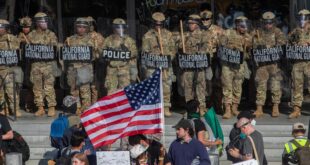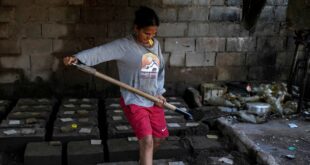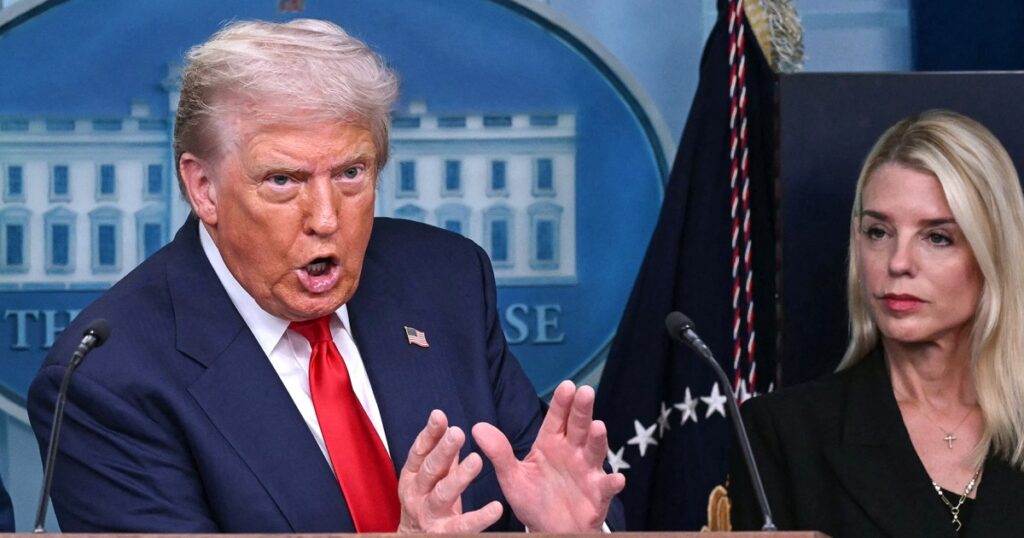
Jillian Snider, a retired New York Police Department officer, began working at a think tank in downtown Washington, D.C., four years ago. Back then, at the height of the pandemic, the area had a very different feel.
“You couldn’t walk down 14th Street or 16th Street near the White House without seeing a lot of disorder, a lot of homeless encampments,” Snider recalled. “Today, it’s much cleaner. You feel much safer.”
Snider is among a half-dozen policing and military experts who told NBC News they were perplexed by President Donald Trump’s unprecedented decision to take over the Metropolitan Police Department and order the National Guard to help fight crime in Washington, D.C.
For one, they note, crime is at its lowest level in decades in the nation’s capital. In early January, federal prosecutors in Washington released a press bulletin with the subject line: “Violent crime in D.C. hits 30 year low.” And since then, it has plummeted 26%, according to the Metropolitan Police Department.
Yet Trump on Monday portrayed D.C. as a crime-infested hellscape and said Attorney General Pam Bondi would “take command of the Metropolitan Police Department as of this moment.”
In making his case, Trump ticked off recent violent incidents in Washington, including the fatal shooting of a congressional intern and the attempted carjacking of Edward Coristine, an original Department of Government Efficiency staffer known online as “Big Balls.”
“Our capital city has been overtaken by violent gangs and bloodthirsty criminals, roving mobs of wild youth, drugged out maniacs and homeless people,” Trump said.
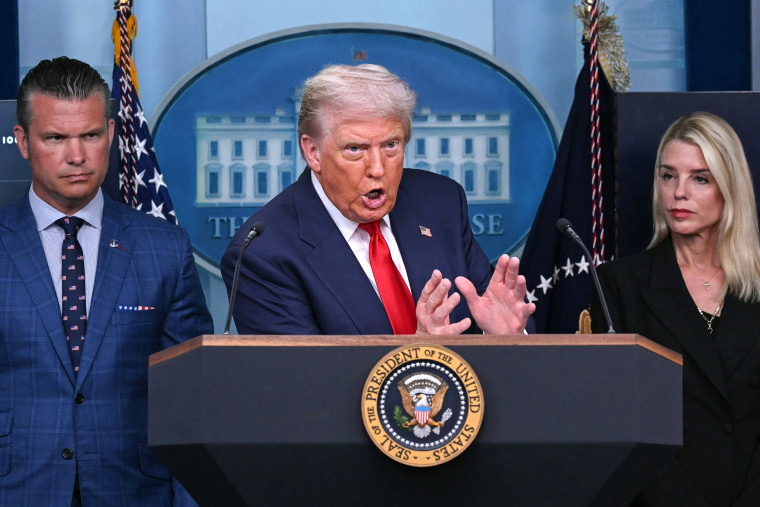
A senior law enforcement official told NBC News that an initial federal effort this weekend was chaotic. As many as 120 FBI agents, mostly from the FBI Washington Field Office, worked shifts with the Metropolitan Police Department this weekend, the official said. But agents were confused about their exact role on the streets and who they reported to at any given time.
A second federal official said that confusion continued on Monday. “No one knows who is in charge or what they’re supposed to do,” the official said.
Unmarked federal law enforcement vehicles are trailing patrol cars in Washington to provide support if needed, another federal official said. Some agents dismissed such efforts a waste of resources, with one jokingly calling the processions “a federal funeral.”
One notable group, the D.C. police union, said it supports the takeover by the president, saying the department has been beset by “chronic mismanagement” and “staffing shortages.”
“The union agrees that crime is spiraling out of control, and immediate action is necessary to restore public safety,” it said in a statement. “However, we emphasize that federal intervention must be a temporary measure, with the ultimate goal of empowering a fully staffed and supported MPD to protect our city effectively.”
Concern from former chiefs
The announcement of the federal takeover was met with alarm by Art Acevedo, a retired police chief who led departments in Houston, Austin and Miami.
“Not only is it unprecedented, it’s unwarranted,” Acevedo said. “There’s no reason for it other than the political optics sought by the administration to pretend that crime is out of control and they are the saviors.”
Trump said that he had appointed the administrator of the Drug Enforcement Administration, Terry Cole, as the head of the Metropolitan Police Department.
Cole will report to Bondi, but it is unclear whether Cole will bring in his own staff to run the various divisions of the roughly 3,500 office police department.
At her own press conference later in the day, Mayor Muriel Bowser called Trump’s actions “unsettling and unprecedented.” The attorney general of D.C., Brian Schwab, had also blasted the move and said that he was exploring legal options, but Bowser acknowledged that Trump had the authority to temporarily seize control of the police department.
She noted, however, that “nothing about our organizational chart has changed.”
Trump must notify certain members of Congress within 48 hours about the reason for taking over control of police and the estimated timeline for federal control, according to the D.C. Home Rule Act. The act also indicates that Trump can take control of the D.C. police for 30 days, unless Congress authorizes an extension.
Flooding the streets
The policing experts interviewed by NBC News noted that crime is a nuanced problem that requires a multi-faceted solution that includes the strengthening of social services.
“To just flood the streets of D.C. with law enforcement” and “taking over D.C. local police, it seems like a half-baked idea looking for a problem,” Donell Harvin, a former homeland security and intelligence chief for Washington, D.C., said on MSNBC.
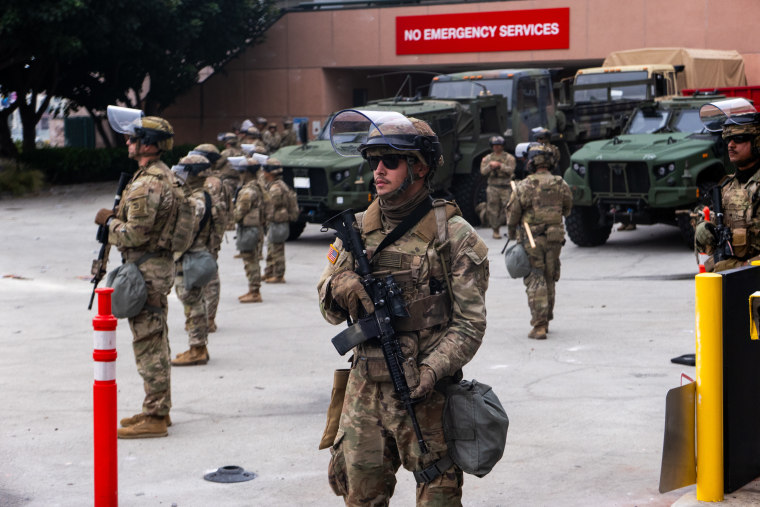
Snider, the retired NYPD officer, said local police agencies are far better equipped to address local crime than federal agencies or the National Guard.
“They know the players. They know the streets. They know where the violence occurs,” said Snider, who is an adjunct lecturer at the John Jay College of Criminal Justice in New York and a policy director of criminal justice and civil liberties at the R Street Institute, a think tank in D.C.
“Any aid from federal agents or the National Guard should be supportive measures,” Snider added. “They shouldn’t be coming in and taking over local policing.”
Acevedo, the retired police chief, said the administration would be able to make an impact on crime by setting aside more money for local enforcement, as it has for its migrant crackdown.
“If the administration truly wanted to make a difference at the state and local level and help make communities safer, it is as simple as increasing the total federal budget dollar investment for local law enforcement to recruit, train, equip, and retain the best and the brightest to serve as peace officers,” he said.
Trump’s penchant for calling in military personnel to tackle domestic unrest is by now well-established. He did so five years ago during the George Floyd protests. And just this summer, he ordered the National Guard and active-duty Marines to Los Angeles to help quell large-scale protests sparked by ramped-up immigration raids.
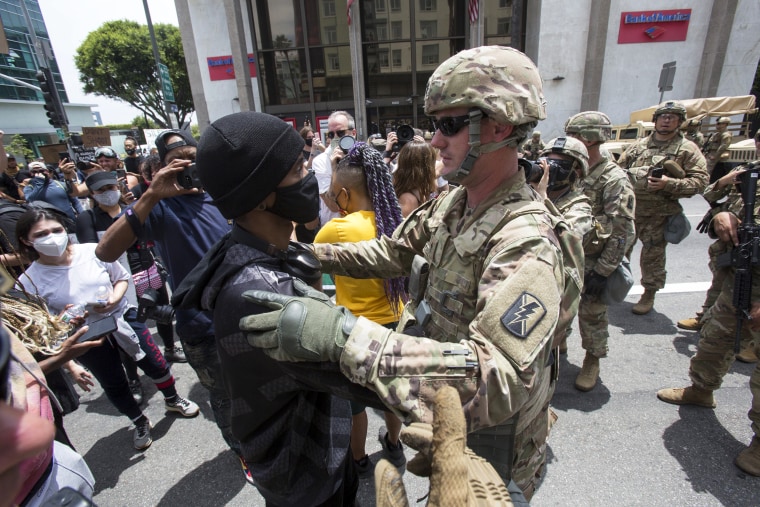
But the National Guard doesn’t have arresting powers, so there is a limit to how involved they can be in fighting crime in D.C.
Retired Army Col. Jack Jacobs said National Guard troops are typically better trained than active duty soldiers to help in urban settings for things like crowd control.
“But they’re not trained to do the things that police do, which is a, patrol, and b, investigate,” Jacobs, an NBC News analyst, said in an interview. “In my view, this is mostly theater, and nothing necessarily useful will come of it.”
Questions about January 6th
Trump’s takeover of the D.C. police force comes several months after he pardoned about 1,500 people convicted of crimes, some of them violent, in the assault on the Capitol on Jan. 6, 2021.
Daniel Hodges, one of dozens of Metropolitan Police Department officers who were brutalized during the riot and whose assailants were among those pardoned by Trump upon his return to office, woke up to the news that Trump had taken over the MPD after working an overnight shift.
“It’s a big photo op. It’s not going to change anything,” Hodges said, speaking while off-duty in his personal capacity.
Hodges, who was in the National Guard for six years, said that National Guard members are not trained in local law enforcement. While D.C. had law enforcement issues that could be better addressed, Hodges said, he doesn’t think Bondi is going to have grand insight into how to deploy MPD officers.
“It’s terrible, it’s disgusting,” Hodges added, “but it’s not a surprise.”
 Latest World Breaking News Online News Portal
Latest World Breaking News Online News Portal


